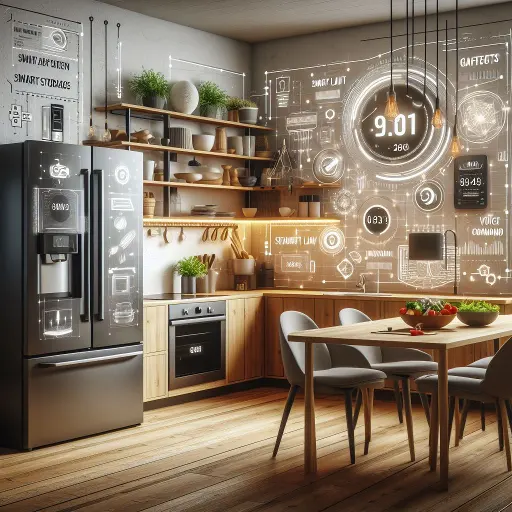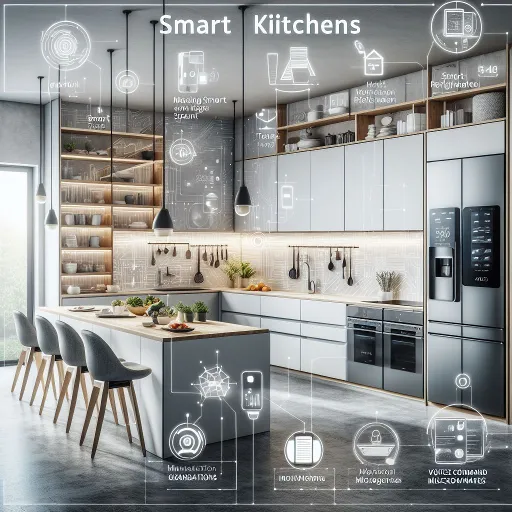
Revolutionize Your Kitchen: Unveiling Genius Smart Design Ideas for 2024
Smart Kitchen Design: A Fusion of Technology and Style
Embarking on the journey of transforming your kitchen into a smart, efficient space is an exciting endeavor. Let’s explore key considerations and innovative ideas on how to make a smart kitchen design, with a special focus on smart kitchen design for small spaces.
Designing Your Smart Kitchen design with Anbre Interiors
As you embark on the transformation of your kitchen, consider the expertise of Anbre Interiors in the design of a kitchen. Anbre Interiors brings a unique blend of functionality and aesthetics to the design of kitchens, ensuring that your smart kitchen not only meets technological standards but also aligns with your style.
Smart Kitchen Design for Small Spaces: A Specialized Approach
Anbre Interiors understands the challenges posed by limited space and specializes in smart kitchen designs that maximize efficiency. Whether it’s a compact urban kitchen or a cozy home space, our designs cater to your needs, integrating cutting-edge technology seamlessly.
Innovative Ideas Tailored by Anbre Interiors
Multifunctional Design Elements: Our designs often feature multifunctional furniture and countertops. Kitchen islands are transformed into smart hubs with built-in storage, smart screens, and task-specific functionalities.
Smart Appliance Integration: Anbre Interiors seamlessly integrates smart appliances into the smart kitchen design. From refrigerators with touchscreens to voice-activated ovens, our designs prioritize functionality without compromising on style.
Efficient Lighting Design: Lighting plays a crucial role in a smart kitchen. Anbre Interiors considers not only the practical aspects but also the ambiance, incorporating smart lighting fixtures that enhance both visibility and mood.
Crafting Your Smart Kitchen Design with Anbre Interiors
Anbre Interiors is not just about the design of a kitchen; it’s about creating a personalized and intelligent space tailored to your lifestyle. Our expertise extends beyond the conventional, exploring new dimensions in smart kitchen design.
Whether you envision a sleek, modern kitchen or a more classic and timeless design, Anbre Interiors has the proficiency to bring your ideas to life. We believe in the marriage of technology and design, ensuring that your smart kitchen not only meets the highest standards of innovation but also becomes a reflection of your unique taste.
As you embark on this exciting journey, let Anbre Interiors guide you in creating a smart kitchen design that combines efficiency, style, and the latest in kitchen technology. With our commitment to excellence and a keen eye for design, we promise a transformative experience in your kitchen’s evolution.
Appliance Integration: Smart fridges: Keep track of expiring groceries, remotely adjust temperature, and access recipes on-screen. Connected ovens and ranges: Preheat your oven from your phone, adjust cooking settings remotely, and receive notifications when dinner is done. Voice-activated controls: Command your appliances with simple voice commands, freeing your hands for other tasks. Built-in countertop tablets: Access recipes, watch cooking tutorials, or stream music while you cook.
Storage & Organization: Smart drawers and cabinets: Automatically open and close with a touch or voice command, keeping your counters clutter-free. Integrated spice racks and utensil holders: Keep everything within easy reach and optimize cabinet space. Hidden appliances and charging stations: Declutter your countertops and keep devices charged and ready to use. Automated waste disposal systems: Eliminate the need for a trash can and say goodbye to messy bin liners.
Lighting & Ambiance: Smart lighting systems: Adjust the lights to set the perfect mood for cooking, dining, or entertaining. Color-changing LED strips: Add a touch of fun and personalization to your kitchen. Under-cabinet lighting: Illuminate your workspace for improved food prep and cooking accuracy. Automated blinds and curtains: Control the natural light effortlessly and enhance your kitchen’s ambiance.
Additional Features: Automated watering systems: Keep your kitchen herbs and indoor plants thriving even when you’re away. Robotic vacuum cleaners: Maintain a clean kitchen floor with minimal effort. Leak detection systems: Prevent potential water damage and safeguard your home investment. Personalization through IoT platforms: Integrate your smart kitchen design devices with voice assistants and other smart home platforms for a truly connected experience.

Crafting Your Intelligent Kitchen with Anbre Interiors: A Symphony of Tech and Design
Embark on a journey where technology seamlessly merges with design, as Anbre Interiors redefines modern living through innovative kitchen solutions. In today’s fast-paced world, we bring forth ingenious ideas to effortlessly integrate smart technology into your modular kitchen, creating a space that embodies efficiency, style, and contemporary living.
Amplifying Efficiency with Smart Kitchen Gadgets
In collaboration with Beautiful Homes, we present a curated guide to infuse intelligence into your kitchen design, elevating your daily activities. Let’s explore brilliant ideas that transform your kitchen into a hub of innovation, making cooking, cleaning, and entertaining delightful experiences.
Kitchen Smart Screen: An Intuitive Hub Anbre Interiors recommends the incorporation of a Kitchen Smart Screen – a dedicated display designed to efficiently manage kitchen tasks. From controlling timers to downloading recipes and swiftly accessing information, these smart screens prioritize user-friendly controls and straightforward graphics, aligning perfectly with the modern kitchen.
Smart Refrigerator: Elevating Freshness and Functionality Upgrade your smart kitchen design with Anbre Interiors’ Smart Refrigerator. Beyond preserving your food, these refrigerators boast advanced features such as touchscreens, built-in cameras for monitoring contents, and the ability to create shopping lists. Some models even connect to the internet, offering recipe suggestions, inventory management, and alerts for maintenance or expiration dates.
Smart Oven: Precision and Convenience Combined Consider Anbre Interiors’ Smart Oven for versatile cooking solutions. These smart ovens offer features like remote control, programmable cooking, and preheat functions. Many can be controlled through smartphone apps, featuring built-in recipe databases, temperature probes, and self-cleaning capabilities.
Voice Command Configured Microwave: A New Dimension in Cooking Anbre Interiors introduces Voice Command Configured Microwaves, adding a touch of innovation to your kitchen. These smart microwaves feature voice control, pre-programmed settings for specific foods, and connectivity to smart home systems for coordinated automation.
Smart Dishwasher: Effortless Cleaning at Your Fingertips Experience the convenience of Smart Dishwashers by Anbre Interiors. These dishwashers can be controlled remotely, allowing you to start or schedule cycles from your smartphone. Some models incorporate sensors to detect load size and adjust water usage, promoting water and energy conservation.
Smart Cooktops and Ranges: Precision and Safety Integrated Anbre Interiors’ Smart Cooktops and Ranges redefine kitchen precision and safety with cutting-edge features. Offering remote control capabilities, these appliances boast precise temperature control, recipe-guided cooking, and automatic shut-off for enhanced safety. Select models even incorporate induction technology, providing faster and more energy-efficient cooking.
While tablet cooktops are gaining popularity in the Indian market, Anbre Interiors takes this innovation to the next level. Tablet cooktops, resembling sleek interactive tablet-style surfaces, serve a dual purpose as a table and stove. When a pot is placed on the cooktop’s surface, a heat ring forms and cools off upon completion of cooking. This revolutionary design signals a shift from traditional stovetops, introducing a next-gen innovation that promises to stay.
Countertop Smart Kitchen Appliances: Versatility Redefined Explore a range of smart appliances from Anbre Interiors, including smart blenders, coffee makers, air fryers, and kitchen scales. These additions transform your kitchen into a versatile space catering to various culinary needs, from blending smoothies to brewing the perfect cup of coffee.
Tips for a Functional Smart Kitchen Design
Anbre Interiors recognizes the importance of a thoughtful design. Here are some tips to ensure functionality in your smart kitchen:
Smart Kitchen Design Layout – The Kitchen Island Advantage: Plan your kitchen layout strategically, incorporating an optimum work triangle. Anbre Interiors recommends placing the kitchen island effectively to ensure a smooth workflow, integrating smart appliances to enhance kitchen dynamics.
Smart Kitchen Design for Small Spaces – Maximizing Efficiency: In smaller spaces, Anbre Interiors suggests incorporating smart storage solutions like pull-out shelves, adjustable dividers, and vertical storage. These additions maximize space, enhance organization, and contribute to efficient smart kitchen design.
Innovative Smart Kitchen Ideas – The Smart Sink in Your Island: Install a built-in sink within your kitchen island, complete with smart faucets and touchless controls or motion sensors. Anbre Interiors recommends these faucets for water conservation and precise temperature control.
Functional Smart Kitchen Ideas – Gas Stove in Your Island: For smaller kitchens, consider incorporating smart countertops with built-in induction cooktops or wireless charging capabilities. Anbre Interiors recommends these countertops to provide additional workspace and reduce clutter.
Smart Kitchen Storage – End-to-End Cabinets for Optimal Organization: Incorporate smart cabinets with sensors or touch controls for easy access and optimized storage capacity. Anbre Interiors emphasizes the importance of extra storage in a smart kitchen design.
Turning Your Dream Smart Kitchen Design into Reality with Anbre Interiors
Whether envisioning a small kitchen design with a few smart appliances or a fully tech-driven smart kitchen, Anbre Interiors is here to bring your vision to life. Our smart kitchen ideas streamline the functioning of your modular kitchen. With a 10-year warranty and a full year of free maintenance, we ensure you enjoy your cooking while we take care of your smart modular kitchen’s upkeep.
Elevate your modular kitchen with Anbre Interiors, where technology and design seamlessly converge.
Exploring Smart Kitchen Design FAQs
Are Smart Cities Sustainable? Smart cities can achieve sustainability by integrating technologies to optimize resource use, enhance energy efficiency, and improve overall quality of life. Key elements include efficient infrastructure, renewable energy, and smart governance.
Are Modular Kitchens Durable? Certainly, modular kitchens are designed for durability. They use high-quality materials and are built to withstand the rigors of daily use. Proper maintenance ensures longevity, making them a durable and practical choice.
Can Modular Kitchens Be Relocated? Indeed, modular kitchens are flexible and can be relocated with some modifications. However, it’s essential to consult with professionals during the design and installation process to facilitate easy dismantling and reassembly.
How to Create a Smart Kitchen? Creating a smart kitchen involves integrating intelligent appliances and technologies. Incorporate devices like smart screens, refrigerators, ovens, and dishwashers. Consider automation, remote control, and energy-efficient features for a truly smart kitchen.
Strategies for Designing a Kitchen in a Limited Space? Maximize efficiency in a small kitchen by using smart storage solutions like pull-out shelves and vertical storage. Opt for multifunctional furniture, utilize the kitchen island effectively, and choose space-saving appliances to make the most of the available space.
Emphasizing Kitchen Smart Essentials: Kitchen smart essentials include devices like smart screens for task management, smart refrigerators with advanced features, efficient smart ovens, voice-controlled microwaves, dishwashers with remote control, and smart cooktops. These essentials enhance convenience and efficiency in the kitchen.
Innovative Ideas for Smart Kitchen Design: Innovate your kitchen with ideas like built-in sinks in the kitchen island with smart faucets, gas stoves integrated into islands, and end-to-end cabinets with smart features. Utilize modern design elements like tiles, blending style with functionality to create a truly smart kitchen design.


0 comments